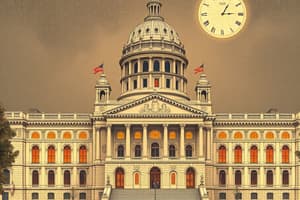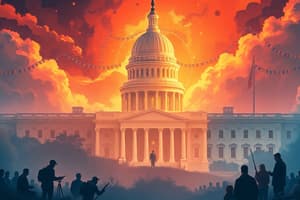Podcast
Questions and Answers
What is the primary purpose of the Necessary Expense Doctrine in appropriations law?
What is the primary purpose of the Necessary Expense Doctrine in appropriations law?
- To allow expenditures necessary for an authorized purpose. (correct)
- To prevent any spending outside the approved budget.
- To define the roles of different agencies in the budgeting process.
- To establish the duration for which appropriations can be utilized.
Which principle of appropriations law governs the duration for which funds may be available for spending?
Which principle of appropriations law governs the duration for which funds may be available for spending?
- Principle of Time (correct)
- Role of Committee Reports
- Principle of Purpose
- Necessary Expense Doctrine
What distinguishes severable appropriations from other types of appropriations?
What distinguishes severable appropriations from other types of appropriations?
- They are only used for emergency expenditures.
- They require committee reports for any spending.
- They can be divided into segments that can be funded over multiple years. (correct)
- They are allocated only for a single fiscal year.
What is the fundamental role of authorizations in appropriations law?
What is the fundamental role of authorizations in appropriations law?
Committee reports contribute to controlling agencies by:
Committee reports contribute to controlling agencies by:
How long is the term for a U.S. Senator as specified in the Constitution?
How long is the term for a U.S. Senator as specified in the Constitution?
Who has the authority to elect Senators as per the Seventeenth Amendment?
Who has the authority to elect Senators as per the Seventeenth Amendment?
What role does the Vice President have in the Senate?
What role does the Vice President have in the Senate?
Which body is responsible for originating all bills related to raising revenue?
Which body is responsible for originating all bills related to raising revenue?
What happens if the President does not approve a bill?
What happens if the President does not approve a bill?
What is required for a bill to become law after the President's objections?
What is required for a bill to become law after the President's objections?
How are votes in both Houses recorded according to the Constitution?
How are votes in both Houses recorded according to the Constitution?
What is the implication of the Vice President not having a vote in the Senate?
What is the implication of the Vice President not having a vote in the Senate?
What is the primary expectation of members of Congress despite polarization?
What is the primary expectation of members of Congress despite polarization?
What is the representation status of U.S. territories in Congress?
What is the representation status of U.S. territories in Congress?
How many basic types of committees are there in Congress?
How many basic types of committees are there in Congress?
What characterizes standing committees in Congress?
What characterizes standing committees in Congress?
What is the role of the delegate elected by U.S. territories?
What is the role of the delegate elected by U.S. territories?
Which of the following is NOT a type of committee in Congress?
Which of the following is NOT a type of committee in Congress?
What feature distinguishes special or select committees from standing committees?
What feature distinguishes special or select committees from standing committees?
How are U.S. territories and districts represented in Congress?
How are U.S. territories and districts represented in Congress?
What is the primary role of a conference committee?
What is the primary role of a conference committee?
Which committees have the most influence over Department of Defense operations?
Which committees have the most influence over Department of Defense operations?
Who hires the professional staff for a congressional committee?
Who hires the professional staff for a congressional committee?
Which of the following correctly describes personal staff of a member of Congress?
Which of the following correctly describes personal staff of a member of Congress?
What is a characteristic of committee staff compared to personal staff?
What is a characteristic of committee staff compared to personal staff?
How are the salaries of personal staff members funded?
How are the salaries of personal staff members funded?
Which of the following is NOT a role of the conference committee?
Which of the following is NOT a role of the conference committee?
What distinguishes committee staff from personal staff?
What distinguishes committee staff from personal staff?
What is the primary purpose of a conference committee?
What is the primary purpose of a conference committee?
Which statement is true regarding the composition of conference committees?
Which statement is true regarding the composition of conference committees?
What happens if conferees exceed their authority during negotiations?
What happens if conferees exceed their authority during negotiations?
How often does the originating chamber instruct its conferees?
How often does the originating chamber instruct its conferees?
What options do conferees dealing with an amendment have?
What options do conferees dealing with an amendment have?
Which power is NOT typically associated with conference committees?
Which power is NOT typically associated with conference committees?
Why is it incorrect to say that a larger number of conferees provides an advantage?
Why is it incorrect to say that a larger number of conferees provides an advantage?
What does a conference committee primarily deal with after deliberation?
What does a conference committee primarily deal with after deliberation?
Flashcards are hidden until you start studying
Study Notes
Congressional Committees
- Congress has three basic types of committees: standing, special/select/other, and joint.
- Standing committees are permanent and cover a specific topic area.
- Special, select, or other committees are established for a specific topic area and can be either long-term or dissolved once the issue has been addressed.
- Joint committees include members from both the House of Representatives and the Senate.
- Conference committees are convened to resolve differences between bills passed by the House and Senate.
House and Senate Committees
- Of the 20 standing committees in the House of Representatives and 16 in the Senate, four have the most direct influence over the operations of the Department of Defense: House and Senate Armed Services, House and Senate Appropriations, House Oversight and Accountability and Senate Homeland Security and Governmental Affairs, House Permanent Select Committee on Intelligence and Senate Select Committee on Intelligence.
Congressional Staff Members
- Each member of Congress has a personal staff to assist with constituent support and lawmaking issues.
- Personal staff members are paid out of allowances granted to each member and serve at the will of the member they work for.
- Professional staffers provide support to various congressional committees.
- Professional staffers are hired by the committee chair and may be supplemented by individuals from members’ staffs.
- Professional staffers serve at the will of the committee chair and are not civil service employees.
Conference Committees
- When the House and Senate pass different versions of a bill, a conference committee may be formed to reconcile the differences.
- Conference committees are composed of members of the respective House and Senate committees.
- Conferees from each House vote as a unit.
- Conference committees can recommend that the originating chamber recede from all or certain of its amendments, the other chamber recede from its disagreement to all or certain of the originating chamber amendments and agree to those, or report an inability to agree in all or in part.
- Each house can instruct its conferees, but this is rarely done.
- Conference committees are very powerful and have often been referred to as the third chamber of Congress.
Studying That Suits You
Use AI to generate personalized quizzes and flashcards to suit your learning preferences.



